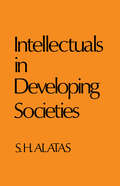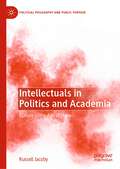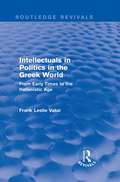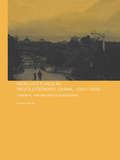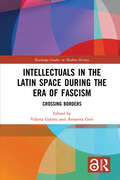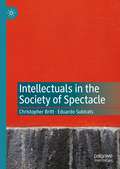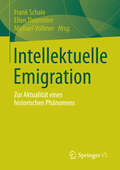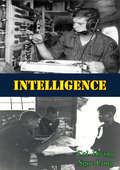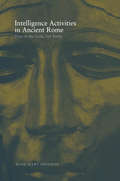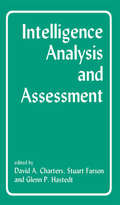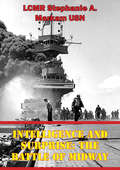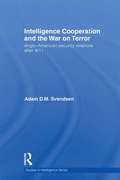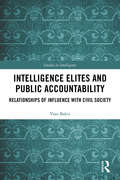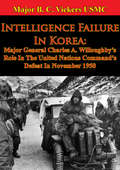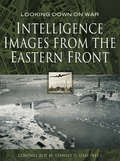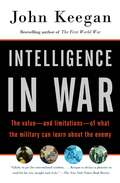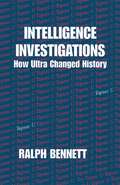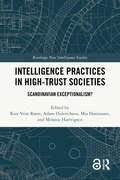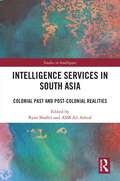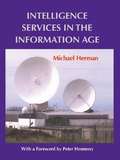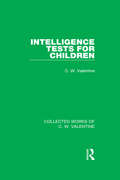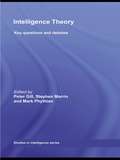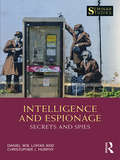- Table View
- List View
Intellectuals in Developing Societies
by Hussein AlatasFirst published in 1977. Routledge is an imprint of Taylor & Francis, an informa company.
Intellectuals in Politics and Academia: Culture in the Age of Hype (Political Philosophy and Public Purpose)
by Russell JacobyThis book addresses the fate of intellectuals in modern culture and politics. Russell Jacoby’s seminal The Last Intellectuals: American Culture in the Age of Academe (1987, 2000) introduced the term “public intellectual” and gave rise to heated controversy. Here Jacoby assesses contemporary public intellectuals, their profound failings and limited achievements. The book includes biting appraisals of well-known intellectuals, such as Noam Chomsky, Hannah Arendt, and Bernard-Henri Lévy, as well as interventions on violence, utopia and multiculturalism.
Intellectuals in Politics in the Greek World: From Early Times to the Hellenistic Age (Routledge Revivals)
by Frank VataiIntellectuals in Politics in the Greek World, first published in 1984, was the first comprehensive study of this recurrent theme in political sociology with specific reference to antiquity, and led to significant revaluation of the role of intellectuals in everyday political life. The term ‘intellectual’ is carefully defined, and figures as diverse as Pythagoras, Plato and Aristotle; Isocrates, Heracleides of Ponteius and Clearchus of Soli are discussed. The author examines the difference between the success of an intellectual politician, like Solon, and the failure of those such as Plato who attempted to mould society to abstract ideals. It is concluded that, ultimately, most philosophers were conspicuously unsuccessful when they intervened in politics: citizens regarded them as propagandists for their rulers, while rulers treated them as intellectual ornaments. The result was that many thinkers retreated to inter-scholastic disputation where the political objects of discussion increasingly became far removed from contemporary reality.
Intellectuals in Revolutionary China, 1921-1949: Leaders, Heroes and Sophisticates (Chinese Worlds)
by Hung-yok IpThis book originally examines how prominent communist intellectuals in China during the revolutionary period (1921 to 1940) constructed and presented identities for themselves and how they narrated their place in the revolution.
Intellectuals in the Latin Space during the Era of Fascism: Crossing Borders (Routledge Studies in Modern History)
by Valeria Galimi Annarita GoriThis volume investigates a galaxy of diverse networks and intellectual actors who engaged in a broad political environment, from conservatism to the most radical right, between the World Wars. Looking beyond fascism, it considers the less-investigated domain of the 'Latin space', which is both geographical and cultural, encompassing countries of both Southern Europe and Latin America. Focus is given to mid-level civil servants, writers, journalists and artists and important 'transnational agents' as well as the larger intellectual networks to which they belonged. The book poses such questions as: In what way did the intellectuals align national and nationalistic values with the project of creating a 'Republic of Letters' that extended beyond each country’s borders, a 'space' in which one could produce and disseminate thought whose objective was to encourage political action? What kinds of networks did they succeed in establishing in the interwar period? Who were these intellectuals-in-action? What role did they play in their institutions’ and cultural associations’ activities? A wider and intricate analytical framework emerges, exploring right-wing intellectual agents and their networks, their travels and the circulation of ideas, during the interwar period and on a transatlantic scale, offering an original contribution to the debate on interwar authoritarian regimes and opening new possibilities for research.
Intellectuals in the Latin Space during the Era of Fascism: Crossing Borders (Routledge Studies in Modern History)
by Valeria Galimi Annarita GoriThis volume investigates a galaxy of diverse networks and intellectual actors who engaged in a broad political environment, from conservatism to the most radical right, between the World Wars. Looking beyond fascism, it considers the less-investigated domain of the 'Latin space', which is both geographical and cultural, encompassing countries of both Southern Europe and Latin America. Focus is given to mid-level civil servants, writers, journalists and artists and important 'transnational agents' as well as the larger intellectual networks to which they belonged. The book poses such questions as: In what way did the intellectuals align national and nationalistic values with the project of creating a 'Republic of Letters' that extended beyond each country’s borders, a 'space' in which one could produce and disseminate thought whose objective was to encourage political action? What kinds of networks did they succeed in establishing in the interwar period? Who were these intellectuals-in-action? What role did they play in their institutions’ and cultural associations’ activities? A wider and intricate analytical framework emerges, exploring right-wing intellectual agents and their networks, their travels and the circulation of ideas, during the interwar period and on a transatlantic scale, offering an original contribution to the debate on interwar authoritarian regimes and opening new possibilities for research.
Intellectuals in the Society of Spectacle
by Christopher Britt Eduardo SubiratsThis book reveals the sense in which our postmodern societies are characterized by the obscene absence of the intellectual. The modern intellectual--who had once been associated with humanism and enlightenment—has in our day been replaced by media stars, talking heads, and technical experts. At issue is the ongoing crisis of democracy, under the aegis of the société du spectacle and its vast networks of politically-induced idiocy, industrially-produced biocide, and militarily-provoked genocide. Spectacle fills the resulting moral and intellectual vacuum with electronic technologies of control, punishment, and destruction. This postmodern tyranny reduces intelligence to mechanistic, positivist, and grammatological models of inquiry, while increasing the segmentation, fragmentation, and dissolution of human existence. The apotheosis of the spectacle explains the intellectual void that lies at the heart of our postmodern decadence; it also accounts for the need to recuperate the humanist values of enlightenment promoted by the modern intellectual tradition.
Intellektuelle Emigration
by Frank Schale Michael Vollmer Ellen ThümmlerEine Intellektuellengeschichte des 20. Jahrhunderts muss die geistigen Einflüsse deutscher Wissenschaftsemigranten zwischen 1933 und 1945 berücksichtigen. Zu einschneidend prägte sie das literarische, kulturelle und politische Denken diesseits und jenseits des Atlantiks. Aus einem breiten Verständnis von Ideengeschichte heraus werden nicht nur prominente Emigranten wie Hannah Arendt, Arnold Bergstraesser und Franz L. Neumann, sondern zugleich dem drohenden Vergessen anheim fallende Flüchtlinge wie Sigmund Neumann, Ferdinand Hermens und Otto Neurath oder bisher kaum beachtete Biographien von André Gorz und Romain Rolland vorgestellt. Einerseits rekonstruieren die Beiträge die dramatischen Lebenslinien sowie die oft unter beklemmenden Bedingungen angefertigten politischen, gesellschafts-, kultur- und wissenschaftstheoretischen Arbeiten. Andererseits wagen sie auch einen Blick auf die Perspektiven der Emigrationsforschung heute.
Intelligence (Indochina Monographs #2)
by Col. Hoang Ngoc LungIncludes over 10 maps and illustrationsThis monograph forms part of the Indochina Monograph series written by senior military personnel from the former Army of the Republic of Vietnam who served against the northern communist invasion."The war in Vietnam was often called an intelligence war. The challenges and responsibilities placed on the South Vietnam--United States--Free World intelligence community were great and constant.During this long war the entire intelligence program improved each day as our data base expanded, as more was learned about the elusive enemy, personnel were trained, and new procedures and techniques were tested and found effective.The most rewarding experience in intelligence activities during the Vietnam war was the very close cooperation and coordination between American and Vietnamese military intelligence personnel and systems. It was this cooperation that helped RVNAF military intelligence upgrade and become self-reliant during the post-cease-fire period.This monograph attempts to record all the facts concerning intelligence activities, its organizations and coordination procedures, its successes and failures during the period from 1965 to the final days of the Republic of Vietnam. In this attempt, one of the difficulties I faced was the lack of documentation to help make my work more accurate and more substantial. To overcome this shortcoming, I have interviewed several former colleagues of mine, American and Vietnamese, all of them highly experienced with intelligence activities in Vietnam. Apart from their invaluable contributions, most of the writing was based on my personal knowledge and experience."-Author's Preface.
Intelligence Activities in Ancient Rome: Trust in the Gods but Verify (Studies in Intelligence)
by Rose Mary SheldonProfessor Sheldon uses the modern concept of the intelligence cycle to trace intelligence activities in Rome whether they were done by private citizens, the government, or the military. Examining a broad range of activities the book looks at the many types of espionage tradecraft that have left their traces in the ancient sources: * intelligence and counterintelligence gathering* covert action* clandestine operations* the use of codes and ciphers Dispelling the myth that such activities are a modern invention, Professor Sheldon explores how these ancient spy stories have modern echoes as well. What is the role of an intelligence service in a free republic? When do the security needs of the state outweigh the rights of the citizen? If we cannot trust our own security services, how safe can we be? Although protected by the Praetorian Guard, seventy-five percent of Roman emperors died by assassination or under attack by pretenders to his throne. Who was guarding the guardians? For students of Rome, and modern social studies too - this will provide a fascinating read.
Intelligence Analysis and Assessment (Studies in Intelligence)
by David A. Charters Glenn P. Hastedt A. Stuart FarsonThese essays cover: assessment systems now in place in Britain, the USA, Germany and Australia; the bureaucratic dynamics of analysis and assessment; the changing ground in intelligence; and the impact of new technologies and modes of communication on intelligence gathering and analysis.
Intelligence And Surprise: The Battle Of Midway
by LCMR Stephanie A. Markam USNIntelligence is a key element in the military strategy of surprise. It is perplexing to many that in today's high technology environment that intelligence cannot prevent surprises from happening. The very nature of the intelligence, no matter how much or how sophisticated it is, will still permit one adversary to surprise another. It is crucial that the operational commander have a clear understanding of the process of the production of intelligence, the uses of intelligence and how it can affect the strategy of surprise. The dramatic success of the Battle of Midway, coming so closely on the heels of the shocking disaster at Pearl Harbor, demonstrated that Admiral Nimitz gained an appreciation for the value of intelligence. I will examine intelligence and the strategy of surprise in general terms and shows how the battle of Midway was influenced by them. Finally, I want to point out that though today's operations may be more sophisticated than those of World War II, there are plenty of critical concerns to consider today with regard to intelligence and surprise at the operational level.
Intelligence Cooperation and the War on Terror: Anglo-American Security Relations after 9/11 (Studies in Intelligence)
by Adam D.M. SvendsenThis book provides an in-depth analysis of UK-US intelligence cooperation in the post-9/11 world. Seeking to connect an analysis of intelligence liaison with the wider realm of Anglo-American Relations, the book draws on a wide range of interviews and consultations with key actors in both countries. The book is centred around two critical and empirical case studies, focusing on the interactions on the key issues of counterterrorism and weapons of mass destruction (WMD) counter-proliferation. These case studies provide substantive insights into a range of interactions such as 9/11, the 7/7 London bombings, the A.Q. Khan nuclear network, the prelude to the 2003 Iraq War, extraordinary rendition and special forces deployments. Drawing on over 60 interviews conducted in the UK and US with prominent decision-makers and practitioners, these issues are examined in the contemporary historical context, with the main focus being on the years 2000-05. This book will be of much interest to students of intelligence studies, foreign policy, security studies and International Relations in general. Adam Svendsen has a Phd in International History from the University of Warwick. He has been a Visiting Scholar at the Center for Peace and Security Studies, Georgetown University, and has contributed to the International Security Programme at Chatham House and to the work of IISS, London.
Intelligence Elites and Public Accountability: Relationships of Influence with Civil Society (Studies in Intelligence)
by Vian BakirThis book provides a definitive overview of the relationships of influence between civil society and intelligence elites. The secrecy surrounding intelligence means that publication of intelligence is highly restricted, barring occasional whistle-blowing and sanitised official leaks. These characteristics mean that intelligence, if publicised, can be highly manipulated by intelligence elites, while civil society’s ability to assess and verify claims is compromised by absence of independent evidence. There are few studies on the relationship between civil society and intelligence elites, which makes it hard to form robust assessments or practical recommendations regarding public oversight of intelligence elites. Addressing that lacuna, this book analyses two case studies of global political significance. The intelligence practices they focus on (contemporary mass surveillance and Bush-era torture-intelligence policies) have been presented as vital in fighting the ‘Global War on Terror’, enmeshing governments of scores of nation-states, while challenging internationally established human rights to privacy and to freedom from torture and enforced disappearance. The book aims to synthesise what is known on relationships of influence between civil society and intelligence elites. It moves away from disciplinary silos, to make original recommendations for how a variety of academic disciplines most likely to study the relationship between civil society and intelligence elites (international relations, history, journalism and media) could productively cross-fertilise. Finally, it aims to create a practical benchmark to enable civil society to better hold intelligence elites publicly accountable. This book will be of great interest to students of intelligence studies, surveillance, media, journalism, civil society, democracy and IR in general.
Intelligence Failure In Korea: Major General Charles A. Willoughby’s Role In The United Nations Command’s Defeat In November 1950
by Major Justin M. HaynesIn November, 1950, the United States Army suffered one of its most devastating defeats ever, in the frozen mountains of North Korea at the hands of the Chinese People's Liberation Army. This defeat fundamentally changed the nature of the Korean War, from a near-certain United Nations victory into a fight for its very survival. It was, however, avoidable.This Chinese victory was partially the result of one of the most glaring failures in U.S. military intelligence history. The officer most responsible for this failure was the Far East Command Assistant Chief of Staff for Intelligence (G2), Major General Charles Andrew Willoughby. His inaccurate intelligence picture contributed to General of the Army Douglas MacArthur's flawed understanding of the nature of the Chinese Communist intent.Charles Willoughby correctly identified the potential threat of a Chinese Communist intervention in Korea in late 1950, yet failed to acknowledge the significance of China's strategic warnings, operational preparations for war and tactical confirmation of their intentions. Willoughby's flawed assessment of Chinese intentions in the fall of 1950 was a result of rampant mirror imaging, complicated by circular analysis stemming from his exclusive control over intelligence reporting on the Korean theater. His significant personal prejudices against the Chinese ability fight exacerbated this problem. Once the United Nations Command undeniably confirmed that Chinese forces had entered North Korea, he minimized their significance in order to support MacArthur's final offensive to the Yalu River in late November, ultimately resulting in the defeat of his command.
Intelligence Images from the Eastern Front (Looking Down on War)
by Colonel Roy M. Stanley IIDespite the Luftwaffe being ordered to destroy millions of aerial photos in 1945, the Allies found no less than twenty tons of photos in eleven locations, including a hoard in a Bavarian barn. These together with vast numbers of photographs taken by German soldiers used for Intelligence analysis were put into classified Allied Intelligence files at a time when USAAF and RAF imagery was being destroyed. Covering Iron Curtain countries they were valuable for cartography and target intelligence during the Cold War.The captured German imagery (called GX) in this book show what the German Army knew about the Soviet Union before and during Operation Barbarossa. Examples show Eastern Front landforms, key cities such as Stalingrad, Moscow, Sevastopol, Leningrad and factories. They are accompanied by helpful comments from a skilled photo interpreter.This unique and diverse collection, some taken from 28,000 feet overhead, others taken by soldiers on the ground, reveal the war on the Eastern Front as it has never been seen before.
Intelligence In War: The Value--and Limitations--of What The Military Can Learn About The Enemy
by John KeeganA masterly look at the value and limitations of intelligence in the conduct of war from the premier military historian of our time, John Keegan. Intelligence gathering is an immensely complicated and vulnerable endeavor. And it often fails. Until the invention of the telegraph and radio, information often traveled no faster than a horse could ride, yet intelligence helped defeat Napoleon. In the twentieth century, photo analysts didn’t recognize Germany’s V-2 rockets for what they were; on the other hand, intelligence helped lead to victory over the Japanese at Midway. In Intelligence in War, John Keegan illustrates that only when paired with force has military intelligence been an effective tool, as it may one day be in besting al-Qaeda.
Intelligence Investigations: How Ultra Changed History (Studies in Intelligence)
by Ralph BennettMilitary intelligence, grossly neglected during the interwar period, had by mid-1942 proved itself indispensable through information gathered from intercepted radio messages in the supposedly unbreakable German Enigma cipher. Ralph Bennett, who worked for four years at Bletchley Park as a senior producer of the intelligence (Ultra') derived from the Enigma decrypts, illustrates in this collection of reprinted essays some of the steps by which he and others developed the new type of information and in the process a candid glimpse of the workings of British intelligence both past and present.
Intelligence Practices in High-Trust Societies: Scandinavian Exceptionalism? (Routledge New Intelligence Studies)
by Kira Vrist Rønn Adam Diderichsen Mia Hartmann Melanie HartvigsenThis book examines the dynamics of intelligence practices in the Scandinavian culture of high social cohesion and high trust.Situated within the new body of scholarly literature, the book emphasizes critical empirical investigations of intelligence practices, highlighting the specific cultural settings of such practices. By providing Scandinavian perspectives on intelligence studies, the work distinguishes Scandinavian intelligence studies from the predominant Anglo-American perspectives. Throughout the Western world, the past two decades have generated a rapid expansion of the legal mandate, funding, and capabilities of intelligence agencies which, simultaneously, have been pushed to renegotiate and renew their legitimacy and democratic mandate in response to a recurrent pattern of scandals, leaks, and failures. While these tendencies are also evident in Scandinavia, the book argues that it is important to emphasize the unique context of cohesion and trust in state agencies that differentiates Scandinavian welfare states from the American (and to a lesser extent British) contexts. This book brings together scholars from Norway, Sweden, and Denmark to address the continuous renegotiation of the legitimacy of state intelligence as it plays out in a Scandinavian setting.This book will be of interest to students of intelligence studies, Nordic politics, security studies, and International Relations.
Intelligence Services in South Asia: Colonial Past and Post-Colonial Realities (Studies in Intelligence)
by Ryan Shaffer Asm Ali AshrafThis book explores colonial and post-colonial intelligence services in South Asia. It traces the genealogy of the institutions to analyze changes and continuities throughout the region.The volume also provides a framework for analyzing how intelligence services developed in these countries by looking at both internal and external issues, and shows how vital and sometimes interconnected these issues are for understanding intelligence in South Asia. It demonstrates how some countries and intelligence services borrowed from the colonial era and others started new institutions to protect national security in response to the shifting demands of the Cold War and post-Cold War era. Bringing together a group of international scholars, the anthology delves into the intelligence services of Afghanistan, Bangladesh, Bhutan, India, the Maldives, Myanmar, Nepal, Pakistan and Sri Lanka and traces how these national services developed in similar and diverse ways.This book will be of much interest to students of intelligence studies, Asian politics, security studies and International Relations.
Intelligence Services in the Information Age (Studies In Intelligence Ser.)
by Michael HermanIntelligence was a central element of the Cold War and the need for it was expected to diminish after the USSR's collapse, yet in recent years it has been in greater demand than ever. The atrocities of 11 September and the subsequent "war on terrorism" now call for an even more intensive effort. Important questions arise on how intelligence fits into the world of increased threats, globalization and expanded international action. This volume contains the recent work on this subject by Michael Herman, British intelligence professional for 35 years and Oxford University academic. It compares intelligence with other government information services, and discusses the British intelligence system and the case for its reform. It also addresses the ethical issues raised by intelligence's methods and results: "do they on balance make for a better world or a worse one?". Other chapters explore a wide range of intelligence topics past and present, including the transatlantic relationship, the alliance strategies of Norway and New Zealand, Mrs Thatcher's "de-unionization" of British Sigint, and personal memories of the British Cabinet Office in the 1970s.Michael Herman argues for intelligence professionalism as a contribution to international security and for its encouragement as a world standard. The modern challenge is for intelligence to support international cooperation in ways originally developed to advance national interests, while at the same time developing some restraint and international "rules of the game", in the use of intrusive and covert methods on its traditional targets. The effects of 11 September on this challenge are discussed in a thoughtful afterword.
Intelligence Tests for Children (Collected Works of C.W. Valentine)
by C.W. ValentineOriginally published in 1945, this title was intended mainly for use by teachers wishing to test children from ages 2-8 in order to establish their intelligence. Based on feedback to the author, this revised edition also includes tests for children up to the age of 15. The tests were used to give a teacher some idea of how much could be expected of each child, so that the class, when practicable, could be divided into groups of varying abilities, which could proceed at paces suited to their respective capacities. It was felt that if ‘inborn intellectual deficiencies’ could be identified at an early age the children could have ‘special treatment’, or in certain cases be placed in a ‘special school’, rather than be potentially written off as ‘lazy’. Today this can be read and enjoyed in its historical context.
Intelligence Theory: Key Questions and Debates
by Peter Gill Mark Phythian Stephen MarrinThis edited volume brings together a range of essays by individuals who are centrally involved in the debate about the role and utility of theory in intelligence studies. The volume includes both classic essays and new articles that critically analyse some key issues: strategic intelligence, the place of international relations theory, theories of
Intelligence Wars: American Secret History from Hitler to al-Qaeda
by Thomas PowersDescribes covert operations since World War II.
Intelligence and Espionage: Secrets And Spies (Seminar Studies)
by Daniel Lomas Christopher John MurphyIntelligence and Espionage: Secrets and Spies provides a global introduction to the role of intelligence – a key, but sometimes controversial, aspect of ensuring national security. Separating fact from fiction, the book draws on past examples to explore the use and misuse of intelligence, examine why failures take place and address important ethical issues over its use. Divided into two parts, the book adopts a thematic approach to the topic, guiding the reader through the collection and analysis of information and its use by policymakers, before looking at intelligence sharing. Lomas and Murphy also explore the important associated activities of counterintelligence and the use of covert action, to influence foreign countries and individuals. Topics covered include human and signals intelligence, the Cuban Missile Crisis, intelligence and Stalin, Trump and the US intelligence community, and the Soviet Bloc. This analysis is supplemented by a comprehensive documents section, containing newly released documents, including material from Edward Snowden’s leaks of classified material. Supported by images, a comprehensive chronology, glossary, and 'who’s who' of key figures, Intelligence and Espionage is an invaluable resource for anyone interested in the role of intelligence in policymaking, international relations and diplomacy, warfighting and politics to the present day.
